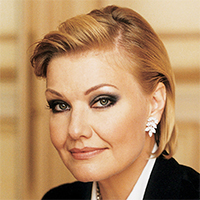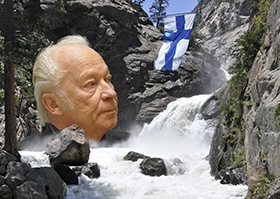
Sage artistry and inconsistently appropriate voice for repertoire characterized Karita Mattila’s recital of French, Finnish, and German songs Tuesday night at Herbst Theatre. The world-renowned soprano achieved ironclad perfection in Aulis Sallinen’s deeply disturbing Four Dream Songs after intermission. Earlier, however, although she has been honored as a Chevalier des Arts et des Lettres by the French government, she was unable to do complete justice to Francis Poulenc’s Banalités and Claude Debussy’s Cinq Poèmes de Baudelaire in the first half of the program. The concluding five songs by the rarely heard Austrian composer Joseph Marx were a pleasure.
What was going on? Mattila’s unique, dusky soprano was a bit wobbly and viscous in the first half. French pronunciations sounded blurry; portamentos were too swoopy. Mattila reported to the audience that her accompanist Martin Katz had been out for weeks with a severe cold; perhaps she had a bit of the bug herself. The sound just didn’t measure up to the lightness and clarity required by the texts of Poulenc’s settings of “Song of Orkenise” and “Going to Paris,” or Debussy’s of “The Balcony” or “The Fountain.”
Nevertheless, her vast experience and maturity showed in the careful structuring of every number and its components despite the off voice. The line “Que les soleils sont beaux par les chaudes soirées!” (How beautiful the sun is on warm evenings!) was gorgeously sculpted in “The Balcony.” Poulenc’s “Hotel,” glorifying Apollinaire’s cigarette smoke, was conveyed with charming indolence.
Throughout, Katz contributed outstanding pianism to his role. Particularly memorable, among so many examples of his art, were the exquisitely watery trickles accompanying “The Fountain.”
Chilling Masterpiece

Sallinen, along with Einojuhani Rautavaara, is an elder statesman of Finnish music, with many operas and symphonies to his credit. Written in 1972 to the Finnish poetry of Paavo Haavikko, the Four Dream Songs contemplate dreaming, sleep, and night in shadows of memories and death. The set reaches its climax in the fourth song, with the titular refrain “There is no stream that journeys so swiftly as life itself. ‘Tis evening when you have crossed the river,” accompanied by chromatically descending tonalities like blood circling a drain hole.
Mattila created an even more powerful impression of Sallinen’s masterpiece than her earlier sterling recording on the Finlandia label from 20-plus years ago. She intoned the concluding lines to the first poem, “Unesta tehty mies” (Man made from sleep), translated “I cannot tell him ‘Leave me now!’ this man who is dead, is dead,” like an open door in an Arctic winter outpost, sending chills up the spine. Throughout the set, Mattila displayed an immense but subtle range of expression that betrayed her long-term and intimate familiarity with Sallinen’s idiom. At the end, I couldn’t tell whether the audience failed to appreciate the profundity of the music and its rendition, or whether it was simply too stunned to give Mattila the ovation she deserved.
As she explained to the audience about Finns, “We love to suffer.” When Sallinen’s music was at its bleakest, Mattila was at her best. The underlying angst in some of Marx’s songs, along with the German diction, was also superbly brought out. The bulk of his material, however, was lighter and gushingly Romantic, much like his compatriot Erich Wolfgang Korngold — fun to listen to, but not as stirring. Katz showed his fine stuff again in the long introduction to “Chopin Waltz,” inexplicably translated into French on the program instead of the German in which it was sung.
The encores pretty much summarized the concert. Sadly, Mattila’s weighty approach did not fit the Eliza Doolittle of my memory in “I could have danced all night,” but when she followed it with a wonderful and unusually frisky Finnish folksong, she was a star again.

